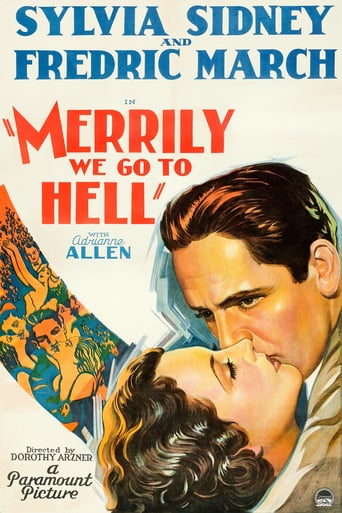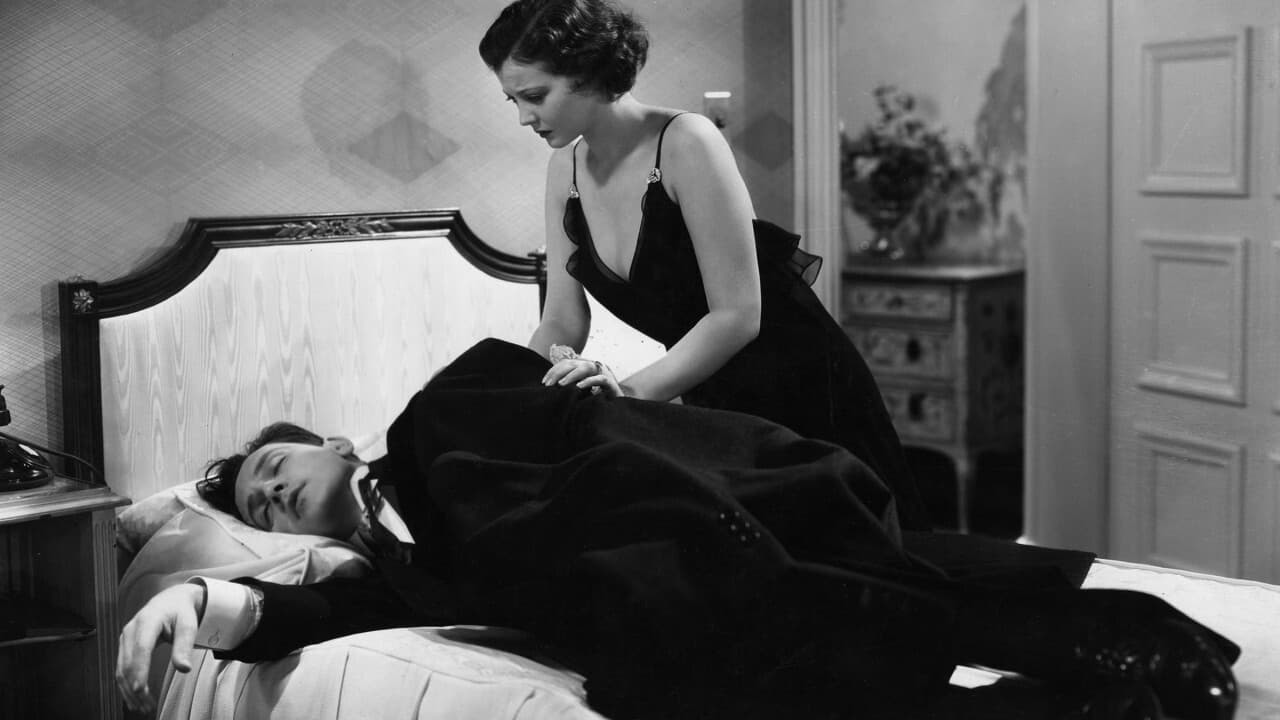JohnHowardReid
Director Dorothy Arzner was extremely popular with her stars because she always coddled them with close-up after close-up and ensured they were always fastidiously wardrobed and photographed to perfection, no matter how soap-suddy the screenplay. "Merrily We Go To Hell" (1932) serves as another typical example of her languid, star-indulgent style. Lovers of weepie-eyed Sylvia Sidney and sartorially splendid Fredric March will enjoy both the 9/10 VintageFilmBuff DVD and its 10/10 Universal rival. The only thing I really liked about this predictably plotted, slow- moving film was the unexpected appearance of perennial butler Charles Coleman as a gossip columnist with a well-founded dislike for our wastrel hero. But as for Cary Grant pouring on the charm in a small bit at a party scene, words fail me!
DangerAwesome
This is a movie that has a lot to say about 'modern' relationships, drinking, and feminism of the time. And for the most part the execution is very good.Merrily We Go to Hell is an extremely well acted film, but that to me is not the highlight of the movie. It's the writing with realistic characters and funny moments that are the best part of it. It is one of the better performances I've seen from Sylvia Sidney, which is a little odd as its one of her earliest.Fredric March stars as a man who doesn't deserve the love of a rich girl that has fallen for him. He's frequently drunk (the title of the film is his favorite drinking toast) and disappoints her at nearly every turn. It's hard to understand exactly what Joan (Sidney) likes about him so much. But that's the way love is sometimes. Joan takes the good with the bad and always seems to forgive the bad, no matter how appalling. Jerry (March) is still getting over his last relationship, attempting to drink it off.One moment in that part of the story was a highlight for me, where Jerry mentions his previous girlfriend. Joan asks if he has a picture of her, and he responds by saying he has one hidden away somewhere that he looks at once in a blue moon when he's feeling lonely. The movie immediately cuts to him arriving home and the picture of the girl he was mentioning is framed on the wall, with a personal note written to him on it. A clear omen for things to come.Merrily We Go to Hell does a fabulous job showing the dark side of drinking, something movies of the time rarely did. As the overall weakness of Jerry and Joan's relationship becomes unraveled, it takes Joan just a little longer than it seems like it should to finally get the courage to leave him. This is very much a sign of the times Depression-era picture. Showing the underlying unhappiness in the lives of socialites.If you are are a Carey Grant fan, he is essentially a pawn in the relationship game. As Jerry seems to be falling for his ex, the star of his new play, Joan attempts to give him a taste of his own medicine by going out with the other star of his play (Grant). Grant has maybe 4 or 5 lines.My only major criticism of the movie is the ending. I know it was a written rule in Hollywood at the time for movies to have a happy ending, but I don't consider the two of them getting back together a happy ending. Joan was right to leave him and she never should have taken him back. She was better off without him. Ending on the scene where she leaves would have been a better ending climatically, as well as been a happier ending. But in the time period that ending would not have been possible.
kidboots
The title was immortalized by the British censor, who apparently insisted that the last word be replaced by a dash!!! People flocking to the movie for a bit of titilation would have felt pretty disappointed by this pap - although with Sylvia Sidney and Frederic March in the leads - it was high grade soap opera. Taken from Cleo Lucas' novel "I, Jerry, Take Thee Joan", even though it got Sylvia out of prison and into high society (she was constantly on Best Dressed Lists during the 30s), the plot made sure she suffered like never before.Joan (Sylvia Sidney) meets Jerry (Frederic March) at a New Year's Eve party. She is instantly taken with him and his eccentric humor. He is very drunk and teaches her his "theme song" "Merrily We Go to Hell", but when she says goodbye, he is too drunk to remember who she is. For her, it is love at first sight, but she puts up with a lot from him - even passing out drunk at their engagement party - her father is not amused.They marry and after an initial struggle, Jerry finally gets his play produced - with his old girlfriend Claire in the lead. Adrienne Allen is right up there with Sidney and March, she was just super as the neurotic wife in "The Night of June 13th" and she brings intelligence to this "other woman" role. Of course, after months on the wagon, Jerry falls back into his old drunken ways but the twist is, Joan follows him "Merrily to Hell". When she becomes ill through too much riotous living, she returns to her father, who protects her and refuses to let Jerry near her. The movie ends with a repentant Jerry, at the hospital, vowing, as Joan clings to life, to give up his old ways and telling Joan those three little words (I love you) that she has never heard him speak before. I tend to agree with the blurb on my DVD cover, who knows whether Jerry will stick to his pledge? During the movie, he had been "on the wagon" a couple of times and when Joan rashly starts to drink, he welcomes her as a drinking buddy - I would have thought that would have been his turning point - but no!!! Skeets Gallagher is always great to have around and he is just marvellous as Jerry's tap dancing drinking buddy. Florence Britton is beautiful and elegant as Joan's concerned friend.Recommended.
GManfred
Once you get past the appalling title, this is a good picture. It's a Pre-Code film and must have been naughty in its day, but is tame by today's standards. It involves a fairly routine love story pulled out of the doldrums by Director Dorothy Arzner and by exceptional acting performances by the two principals, Frederic March and Sylvia Sidney. Poor Sylvia suffered through countless 30's tearjerkers and she is once again miserable here as the put-upon wife of drunken writer March. Was never a fan of Sylvia's, particularly as she became desiccated and more pathetic in later years, but she never looked lovelier and more appealing than in this movie. Skeets Gallagher plays March's drinking buddy and adds immeasurable stature to the film. He remains one of Hollywood's most shamefully underutilized and overlooked talents.Was surprised to learn that a strain of Womens Lib flourished in the early 30's, as our heroine declares her independence (more or less) from her inebriated husband and, in addition, her wedding vow did not include the words "honor and obey", which I thought were de rigeur until mid-century. This last may have been a directorial touch of a feminist director.This is an underrated, under-appreciated movie, especially if you enjoy solid acting and are a sucker for a pretty face, to borrow a phrase.


 AD
AD


